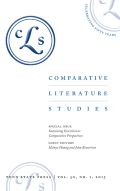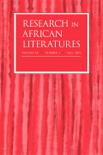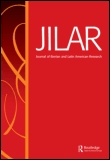
Tintas-Quaderni di Letterature Iberiche e Iberoamericane
Scope & Guideline
Unlocking the Secrets of Literary Heritage in the Iberian Peninsula and Beyond
Introduction
Aims and Scopes
- Exploration of Literary Themes:
The journal emphasizes the exploration of significant literary themes such as identity, memory, nostalgia, love, and existential questions, often reflecting on the human condition through poetic and narrative forms. - Cultural and Historical Contexts:
Articles frequently analyze literary works within their broader cultural and historical contexts, addressing how social, political, and economic factors influence literary expression and reception. - Translation and Adaptation Studies:
The journal publishes translations of poetry and prose, along with studies on the challenges and nuances of translating literary works, highlighting the importance of cross-cultural dialogue. - Interdisciplinary Approaches:
Contributions often draw from various disciplines, including literary theory, sociology, and cultural studies, to provide a multifaceted understanding of texts and their implications. - Focus on Contemporary Issues:
The journal maintains a consistent focus on contemporary literary issues, engaging with modern themes such as migration, gender violence, and personal crises, which resonate with current societal challenges.
Trending and Emerging
- Existential and Philosophical Questions:
Recent papers increasingly engage with existential themes, questioning life, death, and the meaning of existence, as seen in titles addressing eternal life and personal crises. - Social Issues and Personal Narratives:
There is a noticeable trend towards addressing pressing social issues such as assisted suicide, gender violence, and the implications of migration, reflecting a commitment to literature as a means of social critique. - Poetic Experimentation and Form:
The journal has embraced experimental approaches to poetry and narrative forms, showcasing innovative structures and styles that challenge traditional literary conventions. - Interdisciplinary Connections:
Emerging works frequently draw connections between literature and other fields, such as psychology, sociology, and visual arts, highlighting the interdisciplinary nature of contemporary literary studies.
Declining or Waning
- Traditional Historical Literature:
There appears to be a decreasing emphasis on traditional historical literature, with fewer publications focused solely on classic texts or historical narratives, as contemporary themes gain more attention. - Purely Academic Literary Criticism:
The journal has shifted away from purely academic critical essays that do not engage with broader cultural or social contexts, favoring more accessible and interdisciplinary approaches. - Regional Focus on Specific National Literatures:
The focus on specific national literatures, such as singular examinations of lesser-known regional authors, has declined, with a broader, transnational approach becoming more prevalent.
Similar Journals

COMPARATIVE LITERATURE STUDIES
Cultivating Insightful Analysis Across BordersComparative Literature Studies is a distinguished journal published by Penn State University Press, focusing on the diverse and evolving field of comparative literature. With an ISSN of 0010-4132 and an E-ISSN of 1528-4212, this quarterly journal has been a critical platform for scholarly dialogue and interdisciplinary research since its inception in 2000. The journal proudly ranks in the Q3 category for Cultural Studies and Q2 for Literature and Literary Theory (2023), showcasing its significant impact within these domains. Notably, it ranks #214/1106 in Literature and Literary Theory according to Scopus, placing it in the 80th percentile—highlighting its relevance and quality in the global academic landscape. Despite its traditional subscription model, the journal remains a crucial resource for researchers, professionals, and students keen on exploring the intersections of cultures, texts, and histories. By publishing cutting-edge research and critical essays, Comparative Literature Studies aims to expand the horizons of literary analysis and foster innovative scholarly exchanges.

Theleme-Revista Complutense de Estudios Franceses
Fostering Dialogue in the World of French ScholarshipTheleme-Revista Complutense de Estudios Franceses is a distinguished academic journal published by UNIV COMPLUTENSE MADRID, SERVICIO PUBLICACIONES, dedicated to the exploration of French studies within the fields of linguistics and literature. With an ISSN of 1139-9368 and an E-ISSN of 1989-8193, this journal has proudly maintained its Open Access policy since 1992, ensuring that scholarly research is accessible to a global audience. Based in Spain, the journal is committed to advancing knowledge and fostering discussion in French linguistic and literary theory, as evidenced by its publication history from 2019 to 2024. Despite its current classification in the Q4 quartile for both Linguistics and Literature and Literary Theory as of 2023, Theleme is positioned to grow in its academic influence, reflecting trends in interdisciplinary research. The journal’s rankings in Scopus underscore its unique contributions and the importance of its discourse in the arts and humanities. Researchers, professionals, and students are encouraged to engage with Theleme as a resource for innovative ideas and comprehensive studies that navigate the rich landscape of French language and literature.

CONFLUENCIA-REVISTA HISPANICA DE CULTURA Y LITERATURA
Exploring the Intersections of Culture and LiteratureCONFLUENCIA-REVISTA HISPANICA DE CULTURA Y LITERATURA, published by Colorado State University, is a pivotal academic journal that has been contributing to the fields of Cultural Studies, Literature and Literary Theory, and Visual Arts and Performing Arts since 2002. With its ISSN 0888-6091 and E-ISSN 2328-6962, the journal aims to foster interdisciplinary dialogue and showcase innovative research that bridges literary analysis with cultural phenomena. As highlighted by its impressive rankings, the journal holds a Q3 category in Cultural Studies and Q2 in both Literature and Literary Theory and Visual Arts and Performing Arts, reflecting its significance and the quality of its contributions. Although it currently does not offer open access, the journal remains a respected platform for scholars, providing rich content that engages and inspires further research in the humanities. As it converges years from 2002 to 2024, CONFLUENCIA stands at the forefront of exploring the complexities of Hispanic culture and literature, making it an indispensable resource for researchers, professionals, and students alike.

REVISTA DE LITERATURA
Empowering the literary community with accessible knowledge.REVISTA DE LITERATURA, published by the Consejo Superior de Investigaciones Científicas (CSIC) in Spain, stands as a beacon of scholarly excellence in the field of Literature and Literary Theory. With an impressive Q1 ranking in its category for 2023, the journal has established a reputable position within the academic community, reflected in its Scopus rank of #427 out of 1106, placing it in the top 61st percentile. Operating under an Open Access model since 2001, it ensures that cutting-edge research on literary texts, theories, and critical practices is freely accessible to all, fostering scholarly dialogue and enhancing the global discourse on literature. The journal’s continuous commitment to advancing literary scholarship from 1996 to 2024 highlights its role in addressing contemporary literary challenges while celebrating diverse voices and ideas. Researchers, professionals, and students alike are encouraged to engage with this vital resource, which not only showcases innovative research but also contributes significantly to the richness of literary studies.

RESEARCH IN AFRICAN LITERATURES
Advancing Critical Discourse in African LiteraturesRESEARCH IN AFRICAN LITERATURES is a prestigious peer-reviewed journal published by Indiana University Press, dedicated to the critical exploration of African literary traditions, cultures, and texts. With an ISSN of 0034-5210 and an E-ISSN of 1527-2044, this journal stands out in the field of literature and literary theory, currently ranking in the 80th percentile of its category according to Scopus, making it a significant platform for scholars and researchers alike. Since its establishment, the journal has evolved through converged volumes from 2002 to 2024, consistently fostering innovative discourse and interdisciplinary approaches that illuminate the complexities of African narratives. Although it does not offer open access, the journal is integral for anyone engaged in African studies, providing critical insights that are essential for understanding the broader implications of literature within diverse cultural contexts. The journal's commitment to high standards of scholarship is reflected in its Q3 quartile ranking and its influential contribution to contemporary literary dialogue.

Journal of Iberian and Latin American Research
Exploring the rich tapestry of Iberian and Latin American narratives.Journal of Iberian and Latin American Research, published by Routledge Journals, Taylor & Francis Ltd, is a key resource for scholars interested in the rich cultural, literary, and sociopolitical landscapes of Iberian and Latin American contexts. With an ISSN of 1326-0219 and an E-ISSN of 2151-9668, this journal is dedicated to advancing research from 1995 to 2008 and continuing between 2010 and 2023, reflecting the evolving dynamics in these regions. Notably esteemed within its field, it holds a Q3 categorization in Cultural Studies and a Q2 rating in Literature and Literary Theory as of 2023. Its strong performance is underscored by its ranking within the 84th percentile in Literature and Literary Theory and engagement within interdisciplinary dialogues across various domains. While it does not offer open access, the journal remains a vital component of academic discourse, attracting researchers, professionals, and students who seek to explore the intricate narratives and theoretical frameworks that shape Iberian and Latin American studies. Whether you are delving into socio-cultural critiques or examining literary trends, the Journal of Iberian and Latin American Research is an indispensable platform for your scholarly endeavors.

Impossibilia-Revista Internacional de Estudios Literarios
Connecting Cultures Through the Power of WordsImpossibilia-Revista Internacional de Estudios Literarios is a premier open access journal dedicated to the vibrant field of literary studies, published by ASSOC CULTURAL IMPOSSIBILIA since 2011. With its ISSN 2174-2464, this international journal encourages the exploration and analysis of diverse literary theories, texts, and contexts, making it an essential resource for researchers, scholars, and students alike. Hailing from Granada, Spain, Impossibilia not only fosters academic discourse in literature but also promotes intercultural dialogue through its commitment to accessibility and inclusivity. While data such as H-index and Scopus rankings are still to be developed, the journal's focus on enriching the literary landscape ensures its growing impact and relevance within the academic community.

Novoe Literaturnoe Obozrenie
Unlocking the Depths of Literary Theory and CritiqueNovoe Literaturnoe Obozrenie, an esteemed publication dedicated to the realms of Cultural Studies and Literature and Literary Theory, serves as a vital resource for scholars and professionals alike. Published by NOVOE LITERATURNOE OBOZRENIE-NEW LITERARY OBSERVER in the Russian Federation, this journal provides critical insights and scholarly critiques that reflect the evolving landscape of literary discourse. With an established H-index and a focus on fostering academic inquiry, the journal has secured its place amidst contemporary scholarly discussions, indexed in Scopus with rankings that illustrate its commitment to quality despite a current presence in the lower quartiles. Novoe Literaturnoe Obozrenie is a non-open-access journal, encouraging a traditional yet scholarly approach to literary studies and remains an essential read for researchers, students, and professionals that seek to deepen their understanding of literature’s impact on culture and society. Publishing from 2016 until 2024, it continues to bridge theoretical frameworks with practical discourse, making significant contributions to the fields it encompasses.

REVISTA IBEROAMERICANA
Illuminating Diverse Narratives from Latin AmericaREVISTA IBEROAMERICANA is a prestigious academic journal published by Liverpool University Press, dedicated to advancing the field of Literature and Literary Theory. With its ISSN 0034-9631 and E-ISSN 2154-4794, this journal has become a vital platform for scholars and practitioners interested in exploring the diverse nuances of Ibero-American literature. Since its inception in 2007 and converging in focus from 2009 to 2024, REVISTA IBEROAMERICANA has established itself in the Q3 quartile of the 2023 rankings in its category (Arts and Humanities _ Literature and Literary Theory), showcasing its commitment to high-quality research that engages with both contemporary and historical literary discourses. Although not open access, the journal provides insightful content that is accessible to researchers and professionals seeking to enrich their understanding of Latin American literary landscapes. With its distinct contribution to the academic dialogue, REVISTA IBEROAMERICANA remains an essential resource for those passionate about the intersection of literature and cultural theory.

POETRY REVIEW
Unveiling the Artistry of Modern PoetryPOETRY REVIEW is a distinguished journal published by the Poetry Society Inc in the United Kingdom, committed to exploring the richness and diversity of contemporary poetry. With an *ISSN of 0032-2156*, this journal has been a platform for poets, scholars, and enthusiasts since its inception, offering insights into literary themes, movements, and innovations from 2002 to 2023. Although listed in the *Q4 category for Literature and Literary Theory*, it continues to engage readers and writers alike with its well-curated issues that encourage dialogue surrounding poetic practices. Published quarterly, POETRY REVIEW excels in fostering a deeper understanding of poetic forms and techniques, making it an essential resource for anyone interested in the evolving landscape of literature. While the journal is not open access, it remains vital for academics and practitioners aiming to stay informed on critical discourses within the field.